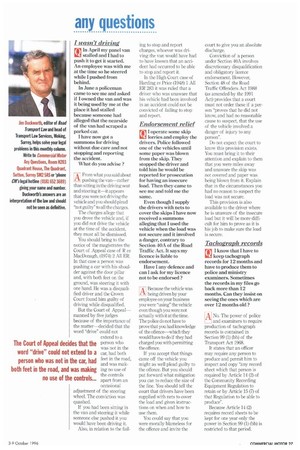I wasn't driving'
Page 31

If you've noticed an error in this article please click here to report it so we can fix it.
In April my panel van stalled and I had to push it to get it started. An employee was with me at the time so he steered while! pushed from behind.
In June a policeman came to see me and asked if I owned the van and was it being used by me at the place it had stalled because someone had alleged that the nearside of the van had scraped a parked car.
I have now got a summons for driving without due care and not stopping and reporting the accident.
What do you advise ?
A From what you said about
pushing the van—rather than sitting in the driving seat and steering it—it appears that you were not driving the vehicle and you should plead "not guilty" to all the charges.
The charges allege that you drove the vehicle and, if you did not drive the vehicle at the time of the accident, they must all be dismissed.
You should bring to the notice of the magistrates the Court of Appeal case of R vs MacDonagh, (1974) 2 All ER. In that case a person was pushing a car with his shoulder against the door pillar and, with both feet on the ground, was steering it with one hand. He was a disqualified driver and the Crown Court found him guilty of driving while disqualified.
But the Court of Appeal— manned by five judges because of the importance of the matter—decided that the word "drive" could not extend to a person who was not in the car, had both feet in the road, and was making no use of the controls apart from an occasional adjustment of the steering wheel. The conviction was quashed, If you had been sitting in the van and steering it while someone else pushed it you would have been driving it.
Also, in relation to the fail
ing to stop and report charges, whoever was driving the van would have had to have known that an accident had occurred to be able to stop and report it In the high Court case of Harding vs Price (1948) 1 All ER 28,3 it was ruled that a driver who was unaware that his vehicle had been involved in an accident could not be convicted of failing to stop and report.








































































































